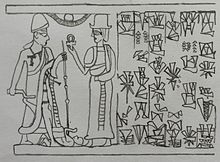King Hiram extended
biblico-historically
Part Five: Father of King Hiram
by
Damien F. Mackey
“Adoniram, Adoram and Hadoram may be the same person.
Solomon reigned for forty years (1 Kings 11:42), so it's possible that
Adoram started as a young man in service of David,
and came to his end shortly after Solomon's death …”.
Abarim Publications
In Part Four of this series:
https://www.academia.edu/35462635/King_Hiram_extended_biblico-historically._Part_Four_Summary_Hiram_s_trade_in_timber_logs_boats
I listed as follows the many ‘faces’ of the biblical King Hiram at which I had arrived:
I listed as follows the many ‘faces’ of the biblical King Hiram at which I had arrived:
The biblical (i) King Hiram has been enlarged in this series, both biblically and historically, to embrace (ii) King David’s chief organiser of the labour force, Adoniram (Adoram); and (iii) Joram (Hadoram) of Hamath; and (iv) Iarim-Lim of Aleppo; and (v) Idrimi of Alalakh.
In textbook history, (iv) would pre-date King David by not too much short of a millennium; whilst (v) would pre-date King David by about half a millennium.
Now, given that we know who was the father of (ii) Adoniram, and also who was the father of (iv) Iarim-Lim (or Yarim-Lim), then it might be an interesting study to compare the two names.
At this stage, all that I can say about the father of (ii) Adoniram, is that his name was Abda, as we learn from I Kings 4:6: “… Adoniram the son of Abda was over the levy”.
וַאֲדֹנִירָם בֶּן-עַבְדָּא, עַל-הַמַּס
“The name Abda comes from the root עבד (abad), meaning servant or to serve …”:
That is about as much as we can know about Abda at this stage.
Abarim Publications, again, now referring to Abda’s son, Adoniram, has this to say:
There's only one Adoniram in the Bible but there's something noteworthy curious about him, or rather his name. Adoniram, son of Abda, is the commander of the men subject to forced labor during the time of king Solomon (1 Kings 4:6, 5:14). This ties him directly to the building of the temple because even though the temple was so holy that it was to be build without making noise (without using proper tools — 1 Kings 6:7), it was earthly enough to necessitate the abuse of myriads of slaves. Many of these slaves were levied from the Israelite households that owned them (1 Kings 5:13), but a great many more were drawn from the indigenous peoples of Canaan (9:20-22).
What is curious about this Adoniram is that when we are introduced to him — in 2 Samuel 20:24, when he's still working for David — he's called אדרם (Adoram). The difference between Adoram and Adoniram is so large that commentators speak of a corrupted contraction; they really mean different things. The obvious solution is to propose that Adoram the slave driver who worked for David is not the same as Adoniram the slave driver who worked for Solomon.
However, there's a third slave driver, and he works for king Rehoboam, the son of Solomon (2 Chronicles 10:18). Young Rehoboam is not very diplomatic and in his early reign he wildly promises to wield the whip much fiercer than his father ever did — namely via his slave driver, we may assume. This causes the northern tribes to follow the rebel Jeroboam in secession, and to counteract this, Rehoboam sends in slave driver number three, called הדורם (Hadoram). The only difference between the names Hadoram and Adoram is that the letter aleph of Adoram is now the he of Hadoram. Alternation between the letters א (aleph) and the letter ה (he) is common enough for Adoram and Hadoram to be the same person. But certainty about this is too tall an order. Whoever he is, when Hadoram arrives on the scene, the tribes successively stone him to death and thus terminate an either very short or very long career.
Adoniram, Adoram and Hadoram may be the same person. Solomon reigned for forty years (1 Kings 11:42), so it's possible that Adoram started as a young man in service of David, and came to his end shortly after Solomon's death ….
[End of quote]
The name Abda, which is related to ‘Obadiah:
is clearly a shortened name, lacking a theophoric ending (either -iah, or -el).
Its longer version would be, e.g., Abdael, Abdiel, “Servant of God”.
As for (iv) Iarim-Lim, his father is generally named Abba-el, a name which, though phonetically very similar to our Abdael, or Abdiel, would not have the same meaning.
Abba-el, the father of Iarim-Lim, is designated Abba-el II.
According to Wikipedia: https://en.wikipedia.org/wiki/Abba-El_II
“Abba-El II (reigned middle 16th century BC - Middle chronology) was the king of Halab (formerly Yamhad) who reigned after the withdrawal of the Hittites.[1]”
The “Yamhad” dynasty was ethnically Amorite.
Now, there is a noteworthy Amorite king or chieftain (rabiān amurrim), Abda-el, whose name, at least, is a perfect fit for an Abda. Unfortunately so little is known about him at this stage, though, that it is quite impossible to tell if he can be matched up, either chronologically or geographically, to the similarly important Abba-el.

No comments:
Post a Comment